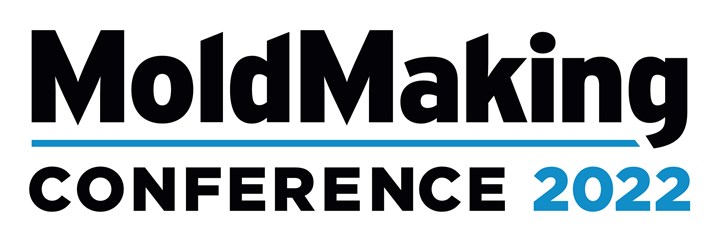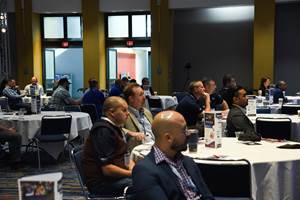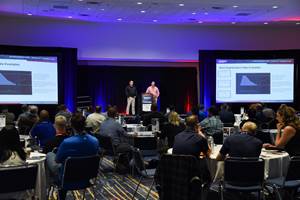Mold Engineering
Goal: To bring to the forefront the technologies and best practices necessary for the critical decision-making that needs to take place by the mold buyer and mold builder. Topics will include part/mold design, simulation, putting intelligence in the mold, and a look at innovative ways OEMs, molders and moldmakers are working together.
Who Should Attend: Those on the front line of decisions being made between the mold builder and buyer—Mold Shop Senior Management, Mold Procurement Personnel, Mold Designers, Part Design, as well as processing and troubleshooting personnel.
Sessions
Connecting Industry 4.0 Technology to your Molds and Molding Process, Don Smith, NA Tooling Manager, Scholle IPN
Next level tooling or Tooling 4.0 is all about understanding what is going on inside of the mold, during each cycle, by taking measurements of the physical dynamics … using scientific molding and data gathering. It means measuring pressure, temperature, and time, for example. So, instead of flying by the seat of our pants, we can now fly by instruments, and actually, understand what is happening inside of the mold and then make any necessary adjustments. Come learn how the right data can:
- Meet cycle time requirements with new mold components by using additive manufacturing, better venting, or monitoring with pressure sensors to provide feedback through the mold, into the press, then onto the production environment.
- Test mold designs virtually with software, to get feedback and to set baselines for cycle time.
- Test a mold with software and sensors to see where the team needs to optimize for cooling, pressure, pack, balance, etc.
- Qualify a mold using a scientific method to create a Design of Experiments (DOE) to generate the process window, and to set sensors minimum/maximum levels.
- Use high-speed electric molding machines that feedback information via pressure and temperature sensors, and relay information back to the system, keeping the mold in control and achieving lights-out manufacturing.
Turning Industry 4.0 into Dollars & Sense, Robert Graup, Business Development Manager/Technical Sales, Intex Tooling
There is not one way to implement Industry 4.0 into a mold shop. When Intex Tooling integrated a production monitoring and business intelligence system into its operation, the team experienced an instant transformation in the way it conducted business. With the Smart Attend smart manufacturing system, Intex can now provide customers with more information and data faster than ever before. Key benefits include a decrease in critical tool build lead times, an improved bottom line and a reorganization of the shop floor to better address gaps in production. However, this result was only possible through proper planning. Planning to implement an Industry 4.0 system may appear to be a daunting task, but to this day the value it has brought to Intex is unparalleled. Come learn how to properly plan the implementation of an Industry 4.0 system that will yield short lead times, an improved bottom line and a more efficient shop floor via three critical steps.
Getting “VR” Real with Moldmaking Training, Torsten Kruse, Kruse Analysis, Rick Finnier, MR Mold
Virtual reality has become mainstream for many industrial applications, allowing users to explore, learn and prepare for new technologies. A new innovative training initiative allows injection molding engineers to evaluate new mold designs in a virtual environment. In this virtual space, engineers can assemble and disassemble a mold to learn about its design and functionality. They can then take the mold to the machine and work through individual mold installation and processing tasks such as water hook-ups, the installation of peripheral devices, preparing the polymer material and beginning the mold set-up and process development. Kruse Molding is here to showcase how it is creating a space for engineers to learn and master these tasks in a virtual environment, giving them the skills and confidence to advance to the next level of expertise in the real world. These VR molding courses are being developed to support a molding company’s overall design and hands-on process training initiatives. The presentation will cover the evolution of training, the importance of utilizing optimization technologies (DFM, DOE), the trend towards hybrid training, and an in-depth look at the research behind the new Kruse Molding VR initiative. To make this session more interactive, there will be an opportunity for audience members to explore the VR technology.
Focused Training Raises Medical Part and Mold Design Skills to the Next Level, Ed Flores, CRM&N Senior Process Engineer, Integer Holdings Corp. and Alex Beaumont, VP Beaumont Technologies/AIM Institute
Seasoned engineer Ed Flores joined the Plastic Injection Molding team at Integer Holdings, a medical device contract manufacturer. Now in charge of the success of many life-critical high-precision, injection-molded plastic parts, he recognized the importance of continuous education and enrolled in the AIM Institute’s Plastics Technology and Engineering (PTE) program. The program was a game changer for Ed’s abilities, confidence and career at Integer.
Come hear how he solved longstanding issues on a complex medical mold. Due to the training, Ed was able to identify three design flaws likely contributing to part failures in an introducer tool: unbalanced fill, gate locations and process/material variances. Starting with the part giving the greatest trouble among the 14 under review, the team changed a runner plate on the three-plate tool to introduce rheological control methodologies to fix the imbalance that was naturally happening in the runner system. Remarkably, that one change resolved most of the tool’s issues and enabled the part with the most significant problems to finally be certified. The improvements also provided significant savings over how they were previously molding the part. The team filled its first production order for that part in late December 2021 without issue. The secret to this sucess was continued education.
Roadmapping Workshop Reveals Key Pain Points and Leverage Areas of Advanced Tooling Manufacturing – Overview for ORNL Advanced Tooling R&D, Dr. Ahmed Arabi Hassen, R&D Staff Scientist, Oak Ridge National Laboratory (ORNL)
Oak Ridge National Laboratory (ORNL) and The University of Toledo, College of Engineering, conducted road mapping sessions to solicit input from industry leaders on research that will benefit U.S. tooling manufacturers. The workshop involved representatives from industry, academia, national labs and government sectors discussing the challenges facing the U.S. mold and die industry to identify the efforts needed to increase the U.S. global market share and decrease the dependence on offshore tooling. Come hear about the four key areas of research revealed that will impact mold manufacturing moving forward: (1) Advancing manufacturing technology for automotive molds and dies, (2) Material innovation for molds and dies, (3) Smart molds and dies with machine learning (ML) and artificial intelligence (AI) and, (4) Workforce development, education and training.

Visit moldmakingconference.com to register today!
If you register before the Early Bird Deadline of October 7th, you will save $200 on the registration cost. Register today and SAVE BIG!
Related Content
MoldMaking Conference Session Spotlight: Presenters Return to Give Progress Report
Want to learn about a strategy to create a highly effective and scalable moldmaking business or the impact of mold digitalization?
Read MoreMoldMaking Conference Session Spotlight: 3D Printing
Want to learn about hybrid tooling inserts or the current state of 3D metal printing?
Read MoreMoldMaking Conference Session Spotlight: Mold Design
Want to learn about collaborative mold design or a plan to reduce back-end troubleshooting?
Read MoreMoldMaking Conference Session Spotlight: Data
Want to learn about digital workflows in mold design or ERP or global mold monitoring and asset management or the impact of tooling digitalization?
Read MoreRead Next
How to Use Strategic Planning Tools, Data to Manage the Human Side of Business
Q&A with Marion Wells, MMT EAB member and founder of Human Asset Management.
Read MoreHow to Use Continuing Education to Remain Competitive in Moldmaking
Continued training helps moldmakers make tooling decisions and properly use the latest cutting tool to efficiently machine high-quality molds.
Read MoreReasons to Use Fiber Lasers for Mold Cleaning
Fiber lasers offer a simplicity, speed, control and portability, minimizing mold cleaning risks.
Read More






















